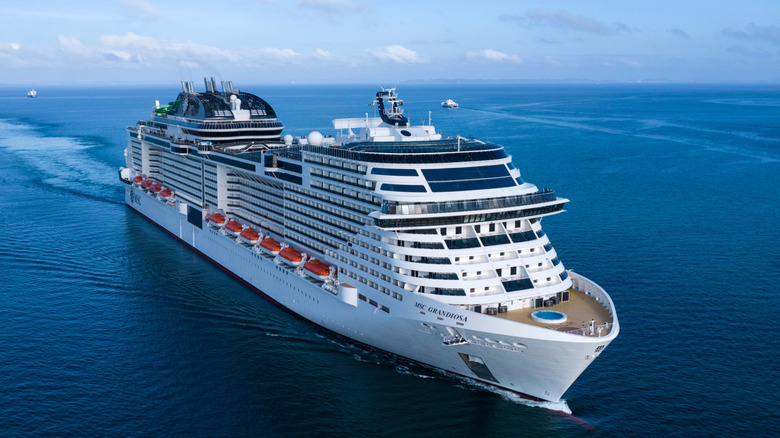Cruise Scams That Try To Trick Seniors Into Spending Money
For many seniors, taking a cruise is a favorite form of vacation. The lure is that you only need to unpack your suitcase one time upon arrival, yet you'll wake up in a different city, or even a different country, every day or two. Besides being convenient, access to included meals and entertainment can make cruising an affordable method to travel as well.
Of course, just like how restaurants often take advantage of customers to spend more money, so too will cruise lines. Some pitfalls onboard include expensive drinks, casino gambling, and live auctions for pieces of artwork that have highly questionable values. While these cruise extras can certainly be considered a money grab, they're not exactly a flat-out scam either. However, there are plenty of actual scams to beware of during the process of purchasing your next cruise.
Seniors will most often come into contact with scammers via internet searches — usually by using terms like "cheap cruises" or "cruise deals." Scammers can, and do, go to great lengths to set up legitimate looking websites and advertising campaigns that often rank high with search engines. Besides fraudulent travel agencies, would-be cruisers should also scrutinize any offers for supposedly "free" trips, as well as pay special attention to how they interact with cruise line crew and employees via social media.
Trust, but verify
Some cruisers prefer to make reservations directly with the cruise lines themselves, which avoids any potential scams. However, legitimate online travel agencies do sometimes offer unique discounts and perks, like free prepaid gratuities for cruise staff, that aren't available elsewhere. So, while it can make sense to book via a travel agency, make sure that the company you're engaging with isn't out to steal your money, or your identity.
Organizations like the Cruise Lines International Association, American Society of Travel Advisors, or even the Better Business Bureau can help cruise shoppers determine if a travel agency they're considering has a good reputation — or if it is actually a hive of scammers. Some common tactics that scammers use to separate seniors from their money include offering extremely cheap cruises before adding on all manner of unnecessary fees. Although seniors might actually take the cruise, the overall cost might end up being higher than if they had booked directly, or with a reputable travel agency.
Once the cruise has been booked, savvy seniors should visit the cruise line's website to verify their reservation. Even if a cruise is purchased from a travel agency, the booking should be searchable with the cruise line directly by using a reservation number or confirmation number. Also, make sure to confirm that your name and correct personal details are assigned to the reservation, and not someone else's. Transacting with a travel agency is one of several things that should always be paid with a credit card, so that protection is available in the event of online fraud.
There's no such thing as a totally free cruise
Seniors should also beware too-good-to-be-true free cruise offers. Sometimes, these scams are couched as a prize for taking a survey or liking a social media post. At best, you'll be sweet-talked into overpaying for upgrades or favorable sailing dates and, at worst, you'll provide your payment information to settle the taxes and fees due for the free cruise — only to receive nothing in return.
Another free cruise scam which isn't really free involves attending a timeshare presentation before traveling. High-pressure salespeople will attempt to talk seniors — or anybody, really — into purchasing a timeshare package, which are typically wildly overpriced. To be clear, timeshares are frequently not worth the expense. If you're dying for a timeshare, avoid buying one at full price as you can often purchase one from an existing owner on the resale market at a steep discount. In return for enduring a few hours worth of timeshare brainwashing and stress, victims may indeed receive a free cruise. However, that reward will likely still be subject to significant taxes, fees, and blackout dates, which erodes any savings you might have received from attending the presentation.
Fraudsters may pose as crew members
During the length of your cruise, it is not uncommon to form a bond with a particularly personable crew member who made the trip more fun and memorable. Certain crew members even become so popular that they develop a significant online presence in the cruise community — to the point where even cruisers who haven't met the crew superstar in question have heard of them. However, these well-known crew members are tempting targets for impersonation by scammers. For example, a well-known former cruise director named John Heald, had no less than seven fake Facebook profiles, all proclaiming to be the real person.
Cruisers who follow or interact with these fake profiles may either solicit or be solicited to receive help with planning their trip. For instance, securing hard-to-get reservations at a ship's restaurant or a sold-out show — for a fee. The fraudsters will tell their prey that the fee for holding such reservations will be refunded, but, of course, the reservation will be nonexistent and the cruise line will have no knowledge of the arrangement. When deciding whether to follow and interact with cruise ship crew profiles, take the age of the social media account you're looking at into consideration, along with the history of the page's posts and the number of followers. Typically, copycat accounts won't be very seasoned or have nearly as many fans as a legitimate page.



